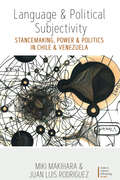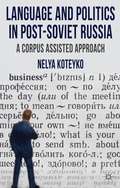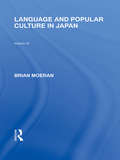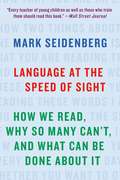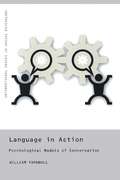- Table View
- List View
Language and Development in Africa
by H. Ekkehard WolffDevelopment is based on communication through language. With more than two thousand languages being used in Africa, language becomes a highly relevant factor in all sectors of political, social, cultural and economic life. This important sociolinguistic dimension hitherto remains underrated and under-researched in 'Western' mainstream development studies. The book discusses the resourcefulness of languages, both local and global, in view of the ongoing transformation of African societies as much as for economic development. From a novel 'applied African sociolinguistics' perspective it analyses the continuing effects of linguistic imperialism on postcolonial African societies, in particular regarding the educational sector, through imposed hegemonic languages such as Arabic and the ex-colonial languages of European provenance. It offers a broad interdisciplinary scientific approach to the linguistic dimensions of sociocultural modernisation and economic development in Africa, written for both the non-linguistically trained reader as much as for the linguistically trained researcher and language practitioner.
Language and Dialect Death: Theorising Sound Change in Obsolescent Gascon
by Damien MooneyThis book offers a systematic acoustic phonetic analysis of both language and dialect death in the region of Béarn, southwestern France. Focusing on Béarnais, a localised dialect of Gascon which is under pressure from French, the author explores the socio-political process of language shift, whereby members of a speech community cease to speak their indigenous language in favour of an incoming dominant language. Gascon is at an advanced stage of this process, making its remaining speakers excellent candidates for the study of language obsolescence, and this unique study will be of interest to researchers working in a broad range of disciplines, including language variation and change, language and dialect contact, Occitan and French, sociophonetics and phonology.
Language and Human Nature
by Mark Halpern"Language and Human Nature" exposes a century's worth of flawed thinking about language, to exhibit some of the dangers it presents, and to suggest a path to recovery. It begins by examining the causes of changes in the English vocabulary. These sometimes take the form of new words, but more often that of new senses for old words. In the course of this examination, Halpern discusses a wide variety of verbal solecisms, vulgarisms, and infelicities generally. His objective is not to deplore such things, but to expose the reasons for their existence, the human traits that generate them.A large part of this book is devoted to contesting the claims of academic linguists to be the only experts in the study of language change. Language is too central to civilized life to be so deeply misunderstood without causing a multitude of troubles throughout our culture. We are currently experiencing such troubles, a number of which are examined here. The exposure of linguists' misunderstandings is not an end in itself, but a necessary first step in recovery from the confusion we are now enmeshed in.The picture of the relationship between words and thoughts that is part of the attempt to deal with language "scientifically" is partly responsible for dangerous cultural developments. The attempt by linguists to treat their subject scientifically makes them view meaning as an irritating complication to be ignored if possible. It turns them into formalists who try to understand language by studying its physical representations, with a resort to semantics only when unavoidable. With words practically stripped of their role as bearers of meaning, it becomes easy to see them as unimportant. Halpern's book is a serious critique of such oversimplified theorizing.
Language and Identity in the Arab World (Routledge Studies in Language and Identity)
by Sandhya Rao Mehta Fathiya Al RashdiLanguage and Identity in the Arab World explores the inextricable link between language and identity, referring particularly to the Arab world. Spanning Indonesia to the United States, the Arab world is here imagined as a continually changing one, with the Arab diaspora asserting its linguistic identity across the world. Crucial questions on transforming linguistic landscapes, the role and implications of migration, and the impact of technology on language use are explored by established and emerging scholars in the field of applied and socio-linguistics. The book asks such crucial questions as how language contact affects or transforms identity, how language reflects changing identities among migrant communities, and how language choices contribute to identity construction in social media. As well as appreciating the breadth and scope of the Arab world, this anthology focuses on the transformative role of language within indigenous and migrant communities as they negotiate between their heritage languages and those spoken by the wider society. Investigating the ways in which identity continues to be imagined and re-constructed in and among Arab communities, this book is indispensable to students, teachers, and anyone who is interested in language contact, linguistic landscapes, and minority language retention as well as the intersections of language and technology.
Language and Institutional Identity in the Post-Apartheid South African Higher Education: Perspectives on Policy and Practice (Language Policy #27)
by Leketi MakalelaThis book examines the intersections between education, identity formation, and language in post-apartheid South Africa with specific attention to higher education. It does so against the backdrop of the core argument that the sector plays a critical role in shaping, (re)producing and perpetuating sectoral, class, sub-national and national identities, which in turn, in the peculiar South African setting, are almost invariably analogous with the historical fault lines determined and dictated by language as a marker of ethnic and racial identity. The chapters in the book grapple with the nuances related to these intersections in the understanding that higher education language policies – overt and/or covert – largely structure institutional cultures, or what has been described as curriculum in higher education institutions. Together, the chapters examine the roles played by higher education, by language policies, and by the intersections of these policies and ethnolinguistic identities in either constructing and perpetuating, or deconstructing ethnolinguistic identities upon which the sector was founded. The introductory chapter lays out the background to the entire book with an emphasis on the policy and practice perspectives on the intersections. The middle chapters describe the so-called “White Universities”, “Black Universities” and “Middle-Man Minorities Universities”. The final chapter maps out future directions of the discourses on language and identity formation in South Africa’s higher education.
Language and Law: A resource book for students (Routledge English Language Introductions)
by Alan Durant Janny HC LeungLanguage plays an essential role both in creating law and in governing its implementation. Providing an accessible and comprehensive introduction to this subject, Language and Law: describes the different registers and genres that make up spoken and written legal language and how they develop over time; analyses real-life examples drawn from court cases from different parts of the world, illustrating the varieties of English used in the courtroom by speakers occupying different roles; addresses the challenges presented to our notions of law and regulation by online communication; discusses the complex role of translation in bilingual and multilingual jurisdictions, including Hong Kong and Canada; and provides readings from key scholars in the discipline, including Lawrence Solan, Peter Goodrich, Marianne Constable, David Mellinkoff, and Chris Heffer. With a wide range of activities throughout, this accessible textbook is essential reading for anyone studying language and law or forensic linguistics. Sections A, B, and C of this book are freely available as a downloadable Open Access PDF under a Creative Commons Attribution-Non Commercial-No Derivatives 4.0 license available at http://www.taylorfrancis.com/books/e/9781315436258
Language and Learning in a Post-Colonial Context: A Critical Ethnographic Study in Schools in Haiti (Routledge Critical Studies in Multilingualism)
by Marky Jean-PierreThis book explores the social, political, and historical forces that mediate language ideology and practices in post-colonial education and how such ideology and practices influence students’ academic achievement. Jean-Pierre provides empirical evidence that a relationship exists between language practices and school underperformance. He takes Haiti as the focus of study, finding that students and teachers experience difficulty constructing knowledge in a setting in which the language they speak at home (Creole) differs from the language of instruction (French). The research is based on ethnographic data collected in classrooms in both private and public school settings in addition to different sectors of the society (e.g. state and private institutions).
Language and Legal Proceedings: Analysing Courtroom Discourse in Cameroon
by Endurence Midinette DissakeThis book investigates language-related problems which arise in courtroom discourse in the Republic of Cameroon, in Central Africa. While Cameroon has over 250 national languages, court cases are conducted in the two official languages: English and French. This is despite the fact that 40% of the adult population is illiterate in these languages, and means that lay litigants often encounter language-related problems during trials. In this study, the author makes use of Speech Act Theory and Interactional Sociolinguistics to analyse the speech acts of both legal professionals and lay litigants as observed in 37 legal cases, demonstrating how the use of exoglossic languages in a highly multilingual nation constitutes a serious issue. The book will be of interest to students and scholars of Forensic Linguistics, Language Policy and Planning, and Discourse Analysis, particularly those with an interest in the African context.
Language and Linguistic Diversity in the US: An Introduction
by Lamont Antieau Susan TamasiThis highly engaging textbook presents a linguistic view of the history, society, and culture of the United States. It discusses the many languages and forms of language that have been used in the US - including standard and nonstandard forms of English, creoles, Native American languages, and immigrant languages from across the globe - and shows how this distribution and diversity of languages has helped shape and define America as well as an American identity. The volume introduces the basic concepts of sociolinguistics and the politics of language through cohesive, up-to-date and accessible coverage of such key topics as dialectal development and the role of English as the majority language, controversies concerning language use in society, languages other than English used in the US, and the policies that have directly or indirectly influenced language use. These topics are presented in such a way that students can examine the inherent diversity of the communicative systems used in the United States as both a form of cultural enrichment and as the basis for socio-political conflict. The author team outlines the different viewpoints on contemporary issues surrounding language in the US and contextualizes these issues within linguistic facts, to help students think critically and formulate logical discussions. To provide opportunities for further examination and debate, chapters are organized around key misconceptions or questions ("I don't have an accent" or "Immigrants don't want to learn English"), bringing them to the forefront for readers to address directly. Language and Linguistic Diversity in the US is a fresh and unique take on a widely taught topic. It is ideal for students from a variety of disciplines or with no prior knowledge of the field, and a useful text for introductory courses on language in the US, American English, language variation, language ideology, and sociolinguistics.
Language and Masculinities: Performances, Intersections, Dislocations (Routledge Critical Studies in Discourse)
by Tommaso M. MilaniThis volume showcases cutting-edge research in the linguistic and discursive study of masculinities, comprising the first significant edited collection on language and masculinities since Johnson and Meinhof’s 1997 volume. Overall, the chapters are linked together by a critical analytical perspective that seeks to understand the relationships between discourse, masculinities, and power. Whereas some of the chapters offer detailed, linguistically informed critiques of the ways in which old and new expressions of masculinities are complicit in the reproduction of men’s hegemonic positions of power, others provide a more complex picture, one in which collusion and subversion go hand in hand. Contributions argue for the need for research on language and masculinities to expand its remit so as to engage with "gay masculinities," and unsettle gendered categories in order to consider the ways in which women, transgender, and intersex individuals also perform a variety of masculinities. Finally, unlike Johnson and Meinhof’s 1997 collection, this volume not only offers a wider—and perhaps "queerer" perspective—on the study of language and masculinities, but also covers a broader geographical and socio-cultural spectrum, including work on Brazil, Israel, New Zealand, Singapore, and South Africa.
Language and Migration
by Tony CapstickLanguage and Migration provides a lively introduction to the relationship between language and migration. Drawing on real-world case studies from Africa, the Americas, Asia, Europe, the Middle East, and New Zealand, this book investigates the language and literacy practices which sustain, extend, or curb different forms of migration. Individual trajectories, family networks, and societal level policy are examined through an interdisciplinary perspective on empires and colonialism, transnationalism, and globalization. Exploring the linguistic diversity which has resulted from voluntary and forced migration, this book covers theories from migration studies, applied linguistics, sociolinguistics, sociology, and education studies, and offers broad coverage of different contexts of migration across the globe. It provides students and teachers with: Migration theories to interrogate current thinking on human mobility. Concepts from applied linguistics combined with other disciplines to explore complex migration experiences in countries of origin and destination. A critical understanding of language and power in economic migration and forced migration. An introduction to the role of language in broader debates about the impact of migration on national and international policies such as international development, global security, and education. Practical guidance on using discourse analysis to identify how migrant identities are constructed in the media and how this affects our understandings of asylum, immigration, and social cohesion. Featuring a range of activities and case studies in each chapter, Language and Migration is essential reading for advanced undergraduate and postgraduate students studying this topic.
Language and Political Subjectivity: Stancemaking, Power and Politics in Chile and Venezuela (Studies in Linguistic Anthropology)
by Miki Makihara Juan L. RodríguezPolitics and power are understood as interconnected yet opposed forms of agency that do not exist without each other and depend on transgressions and the upholding of social boundaries. Language and Political Subjectivity is an ethnographic and historical piece of research that considers how Indigenous and diasporic communities, with their political subjectivities, expand over significant sociohistorical changes, debates, and struggles in the transformation of Chilean democracy and Venezuela’s Bolivarian Revolution. It offers an innovative approach to stancemaking as a rhetorical semiotic process that produces truth, beliefs, and certainties about social realities and relations.
Language and Politics in Post-Soviet Russia
by Nelya KoteykoLanguage and Politics in Post-Soviet Russia critically examines the uses of language in post-Soviet media and political texts between 1998 and 2007. It will be of interest to academics and researchers in the fields of media studies, discourse analysis, corpus linguistics, and scholars in Russian Studies.
Language and Popular Culture in Japan (Routledge Library Editions: Japan)
by Brian MoeranWhen this book was originally published it was the first work of its kind to examine the way in which language is used to express the ‘myth’ of advertising slogans and other popular cultural forms. By making use of general theories from the disciplines of anthropology, linguistics, media studies and semiotics, the book attempts to demystify Japanese culture as it has been hitherto presented in the West, and shows how such cultural forms as ‘noodle westerns’ and high-school baseball uphold the well-known ideologies of ‘selflessness’, ‘diligence’, ‘compliance’ and ‘co-operation’ typically associated with the Japanese. Ultimately, the book poses the question: are those whom we call the Japanese ‘real’ people in their own right, or merely a nation acting out a part written for them by Western civilisation?
Language and Power
by Norman FaircloughLanguage and Power is widely recognised both as a classic and an essential introductory textbook to the field of Critical Discourse Analysis. It focusses on how language functions in maintaining and changing power relations in modern society, the ways of analysing language which can reveal these processes and how people can become more conscious of them, as well as, more able to resist and change them. <P><P>In this twenty-fifth anniversary edition, Norman Fairclough includes a substantial new introduction and brings the discussion up-to-date. He shows both the importance of the book in the development of critical discourse analysis over the past three decades and how language and power relations have changed due to major socio-economic changes. <P><P>It remains vital reading for all students of discourse analysis, critical discourse analysis and other related courses.
Language and Social Justice in Context: Hawaiʻi as a Case Study
by Scott SaftThis book builds on recent research exploring the intersection between language and social justice, using the multilingual context of Hawai'i as a case study. The author offers a discourse-centered approach, providing analyses of actual instances of language use, and argues that the wide range of languages in Hawai'i - Hawaiian, Pidgin, Japanese, Chinese, Tagalog, Ilocano, Marshallese, and Chuukese, as well as the phenomenon of language mixing - all have a significant contribution to make to society. The book also draws on language acquisition research demonstrating positive long-term effects of exposure to multiple languages, and makes the case for educational approaches that foster multilingual abilities among the young members of society. This book will be relevant for academics interested in the intersection of language and social justice and languages in Hawaiʻi, but it should also be of interest to undergraduate and especially graduate students in sociolinguistics, language revitalization and language documentation, discourse analysis, applied linguistics, and pragmatics.
Language and Social Justice: An Introduction to Linguistic Activism
by Helen Sauntson Clare Cunningham Johanna Ennser-Kananen Dai O'BrienLanguage and Social Justice provides readers with the knowledge and analytical skills required to explore why and how social inequalities and injustices are enacted through language, and how they may be challenged.The expert authors introduce readers to theories, concepts, methods and applications which enable them to become ‘activist applied linguists’ in the field of language and social justice. Each chapter contains up-to-date information, case studies, study questions and activities, suggestions for activism, and recommended readings relating to a range of topics within the field of language and social justice research.This innovative and accessible textbook is essential reading for students and scholars engaged in language and social justice research across a range of contexts.
Language and Spirit: Exploring Languages, Religions and Spirituality in Australia Today
by Robyn Moloney Shenouda MansourThis edited book explores stories of linguistic and spiritual identity in the urban and rural Australian landscape. It is an innovative mix of thirty six personal narratives and eleven research studies, which together offer accounts of the intersection of languages, religion and spirituality in people’s lives. Teachers of Indigenous languages speak of the critical connection between language revitalization, the spirituality of Country, and well-being. Both new and long-established diaspora individuals speak of the often complex but vital joint role of language and faith in belonging and heritage. The new dimension which the book brings to multilingualism is relevant to all complex global societies. Language and Spirit is ideal for both the general reader interested in community languages and interfaith issues, and academics in global intercultural studies and Applied Linguistics study wishing to gain a nuanced insight into the Language and Spirit intersection.
Language and Subjectivity (Key Topics in Applied Linguistics)
by Tim McNamaraUnderstanding the role of language within the formation of a sense of self has been revolutionised by developments in social theory, particularly poststructuralism. There is now a new emphasis on the way in which subjects are vulnerable in the face of powerful discourses such as nation, gender, race and sexuality. This book is a clear and engaging introduction to these developments and their relevance to students of language. Using lively and often personal examples throughout, Tim McNamara explores the role of language within processes of subjectivity using the insights of conversation analysis (CA), creating an original conceptual and methodological bridge between the macro- and micro-dimensions of social discourse and everyday conversational interaction.
Language and Sustainable Development (Language Policy #32)
by Humphrey Tonkin Lisa J. McEntee-AtalianisThis book addresses the importance of language in matters of sustainability and incorporating such concerns in implementing the UN’s Sustainable Development Goals (SDGs). Sustainable language policy must aim to include all groups, including language minorities and marginalized populations, such as refugees and aid recipients, in conditions that allow for their inclusion in making and implementing policy. The book brings together nine studies covering such topics as language and digital resources, sustainable and inclusive multilingual education, national language policy, and language in peacekeeping operations. A final chapter addresses the crucial intersection between sociolinguistics and economics, and the implications of this for development and the SDGs.
Language and linguistic contact in ancient Sicily
by Olga Tribulato"Within the field of ancient bilingualism, Sicily represents a unique terrain for analysis as a result of its incredibly rich linguistic history, in which 'colonial' languages belonging to branches as diverse as Italic (Oscan and Latin), Greek and Semitic (Phoenician) interacted with the languages of the natives (the elusive Sicel, Sicanian and Elymian). The result of this ancient melting-pot was a culture characterised by 'postcolonial' features such as ethnic hybridity, multilingualism and artistic and literary experimentation. While Greek soon emerged as the leading language, dominating official communication and literature, epigraphic sources and indirect evidence show that the minority languages held their ground down to the fifth century BCE, and in some cases beyond. The first two parts of the volume discuss these languages and their interaction with Greek, while the third part focuses on the sociolinguistic revolution brought about by the arrival of the Romans"--
Language as a Social Determinant of Health: Translating and Interpreting the COVID-19 Pandemic (Palgrave Studies in Translating and Interpreting)
by Federico Marco FedericiThis edited volume demonstrates the fundamental role translation and interpreting play in multilingual crises. During the COVID-19 pandemic, limited language proficiency of the main language(s) in which information is disseminated exposed people to additional risks, and the contributors analyse risk communication plans and strategies used throughout the world to communicate measures through translation and interpreting. They show that a political willingness to understand the role of language in public health could lead local and national measures to success, sampling approaches from across four continents. The book will be of interest to students and scholars of healthcare translation and interpreting, sociolinguistics and crisis communication, as well as practitioners of risk and crisis communication and professional translators and interpreters.
Language at the Speed of Sight: How We Read, Why So Many Can't, And What Can Be Done About It
by Mark SeidenbergAccording to a leading cognitive scientist, we've been teaching reading wrong. The latest science reveals how we can do it right. <p><p>In 2011, when an international survey reported that students in Shanghai dramatically outperformed American students in reading, math, and science, President Obama declared it a "Sputnik moment": a wake-up call about the dismal state of American education. Little has changed, however, since then: over half of our children still read at a basic level and few become highly proficient. <p><p> Many American children and adults are not functionally literate, with serious consequences. Poor readers are more likely to drop out of the educational system and as adults are unable to fully participate in the workforce, adequately manage their own health care, or advance their children's education. <p><p>In Language at the Speed of Sight, internationally renowned cognitive scientist Mark Seidenberg reveals the underexplored science of reading, which spans cognitive science, neurobiology, and linguistics. As Seidenberg shows, the disconnect between science and education is a major factor in America's chronic underachievement. <p><p>How we teach reading places many children at risk of failure, discriminates against poorer kids, and discourages even those who could have become more successful readers. Children aren't taught basic print skills because educators cling to the disproved theory that good readers guess the words in texts, a strategy that encourages skimming instead of close reading. <p><p>Interventions for children with reading disabilities are delayed because parents are mistakenly told their kids will catch up if they work harder. Learning to read is more difficult for children who speak a minority dialect in the home, but that is not reflected in classroom practices. By building on science's insights, we can improve how our children read, and take real steps toward solving the inequality that illiteracy breeds. <p><p>Both an expert look at our relationship with the written word and a rousing call to action, Language at the Speed of Sight is essential for parents, educators, policy makers, and all others who want to understand why so many fail to read, and how to change that.
Language death
by David CrystalThe rapid endangerment and death of many minority languages across the world is a matter of widespread concern, not only among linguists and anthropologists but among all interested in the issues of cultural identity in an increasingly globalized culture. A leading commentator and popular writer on langauge issues, David Crystal asks the fundamental question, "Why is language death so important?", reviews the reason for the current crisis, and investigates what is being done to reduce its impact. By some counts, only 600 of the 6,000 or so languages in the world are "safe" from the threat of extinction. By some reckonings, the world will, by the end of the twenty-first century, be dominated by a small number of major languages. Language Death provides a stimulating and accessible account of this alarming trend, which, like the large-scale destruction of the environment, is both peculiarly modern and increasingly global. Language Death includes intelligent argument and moving descriptions of the decline and demise of particular languages, as well as practical advise for anyone interested in pursuing the subject further. David Crystal is a leading authority on language, and author of many books, including most recently Language and the Internet, (Cambridge, 2001). He is author or editor of several other books with Cambridge, including the Cambridge Encyclopedia of Language (1997), Cambridge Encyclopedia of the English Language (1995), English as a Global Langauge (1997), Language Death (2000); and Words on Words (University of Chicago, 2000). An internationally renowned writer, journal editor, lecturer and braodcaster, he received an Order of the British Empire in 1995 for his services to the English language.
Language in Action: Psychological Models of Conversation (International Series in Social Psychology)
by William TurnbullFace-to-face conversation between two or more people is a universal form, and perhaps the basic form, of social interaction. It is the primary site of social interaction in all cultures and the place where social and cultural meaning takes shape. Face-to-face conversation between children and parents can also be an important context for social and cognitive development. Given the universality, frequency and importance of conversation in social life, a psychological model of conversation is required for an understanding of the central issues in social and developmental psychology. This book provides such a model.Language in Action presents a critical examination of four models of conversation: the Code model based on Chomsky's linguistic views; the Speech Act model of Austin and Searle; the Inferential model of Grice, and the Conversation Analytic model of Sacks and Schegloff. It also considers the Brown and Levinson model of politeness in conversation. Using many examples from natural talk and drawing on the positive aspects of the reviewed models, Turnbull proposes a new Social Pragmatic model of conversation as social interaction. He also describes the research paradigm of Social Pragmatics that experimental psychologists can use to study conversation. This book will be invaluable for advanced students in psychology, sociology, language and linguistics and communication. It will also make fascinating and lively reading for anyone wanting a greater understanding of this fundamental form of social interaction.











